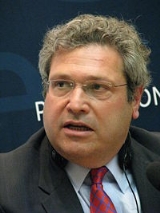
Robert Kagan
Robert Kagan is an American neoconservative scholar and political commentator.
Sourced
- When you don't have a hammer, you don't want anything to look like a nail.
- Alternate version: If you don't have a hammer, you don't want anything to look like a nail.
- Of Paradise and Power, p. 26 http://www.amazon.com/gp/reader/1400040930/ref=sib_dp_pt/103-7601208-4902227#
- According to Kagan, this is a variation of the proverb "When you have a hammer, all problems start to look like nails." (p. 25 of the same book)
- The force de frappe was little more than symbolism; it relieved neither France nor Europe from strategic dependence on the United States (Of Paradise and Power, p. 19)
- The vast majority of Europeans always believed that the threat posed by Saddam Hussein was more tolerable than the risk of removing him. But Americans, being stronger, developed a lower threshold of tolerance for Saddam and his weapons of mass destruction. (Of Paradise and Power, p. 31)
- The United States was losing interest in preserving European security, but at the same time it was hostile to European aspirations to take on the task themselves. Europeans complained about American perfidy, and Americans complained about European weakness and ingratitude. (Of Paradise and Power, p. 43)
- Americans officials have found it hard to believe, but leading officials and politicians in Europe really have worried more about how the United States might handle or mishandle the problem on Iraq — by undertaking unilateral and extralegal military action — than they have ever worried about Iraq itself and Saddam Hussein's weapons of mass destruction. (Of Paradise and Power, p. 61)
- When President Dwight Eisenhower undermined and humiliated Britain and France at Suez in 1956, it was only the most blatant of many American efforts to cut Europe down to size and reduce its already weakening global influence. (Of Paradise and Power, p. 72)
- And now, in the final irony, the fact that the US military power has solved the European problem, especially the "German problem", allows Europeans today, and Germans in particular, to believe that American military power, and the "strategic culture" that has created and sustained it, is outmoded and dangerous. (Of Paradise and Power, p. 73)
